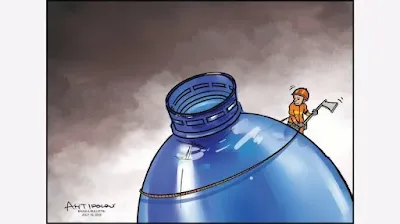By Manila Bulletin
The weather forecast for this weekend is heavy rains in many parts of the country. And with rains, we see the same heartbreaking images – streets flooded, rivers clogged, homes submerged, and livelihoods ruined.
We also see images of the common culprit behind many of these floods—plastic waste. Plastic bags, sachets, straws, and packaging waste that are improperly disposed of find their way into our drainage systems, esteros, and rivers. Over time, they block waterways, prevent water from flowing freely, and turn even a short downpour into a disaster.
The Philippines is already among the world’s worst contributors to ocean plastic pollution. But this isn’t just an environmental issue—it’s a direct threat to our safety, our health, and our future.
We have enough laws on paper to address this problem. Republic Act 9003 or the Ecological Solid Waste Management Act has been around since 2000. More recently, the Extended Producer Responsibility (EPR) Act of 2022 compels big companies to take responsibility for their plastic packaging. Across the country, many local governments have passed ordinances banning single-use plastics such as plastic bags, straws, and styrofoam.
Yet flooding persists, plastic pollution continues, and garbage remains a common sight in our rivers and estuaries. Why? Because laws alone cannot solve this crisis. Real change demands action from everyone: individuals, businesses, and government.
If we want to stop plastics from choking our waterways and worsening floods, we need to begin with ourselves. We can no longer hide behind excuses of convenience or habit. Refusing single-use plastics is one of the most basic yet powerful actions we can take. Bringing our own eco-bags, reusable containers, utensils, and tumblers might seem small, but multiplied across millions of Filipinos, it becomes transformative.
Consumers wield enormous influence. By supporting brands that offer sustainable alternatives and shunning those still wrapped in layers of unnecessary plastic, we send a strong message. Businesses listen to where we spend our money.
We must also educate those around us. In our homes, schools, and workplaces, let’s talk about the link between plastic waste and flooding. Teach children the value of refusing, reducing, reusing, and recycling. Speak up in stores and restaurants when unnecessary plastic is offered.
Plastic bans often fail because businesses—especially small vendors—continue using plastic out of habit or perceived necessity. But change is possible. As customers, we can ask store staff to offer alternatives like paper bags, banana leaves, or reusable containers. We can support local governments by reporting violations and pushing for better enforcement.
Businesses must also understand that they have a role to play. Those who refuse to adapt to the plastics ban should face penalties, while those who innovate and embrace circular economy solutions should be rewarded. The government, for its part, must ensure that the rules are not just written, but followed.
Ending our addiction to plastic isn’t just about carrying our own bags—it’s about changing the system. A true circular economy—where products are reused, refilled, and repurposed—must be the goal. Government policies should encourage and support businesses shifting to sustainable practices. Infrastructure such as recycling plants and composting facilities must be built to handle waste more effectively. Local ordinances should be standardized to avoid confusion and loopholes.
The challenge is clear. The choice is ours. Will we continue to let plastic waste choke our rivers and flood our streets? Or will we take responsibility, change our habits, and demand accountability from those around us?

No comments:
Post a Comment